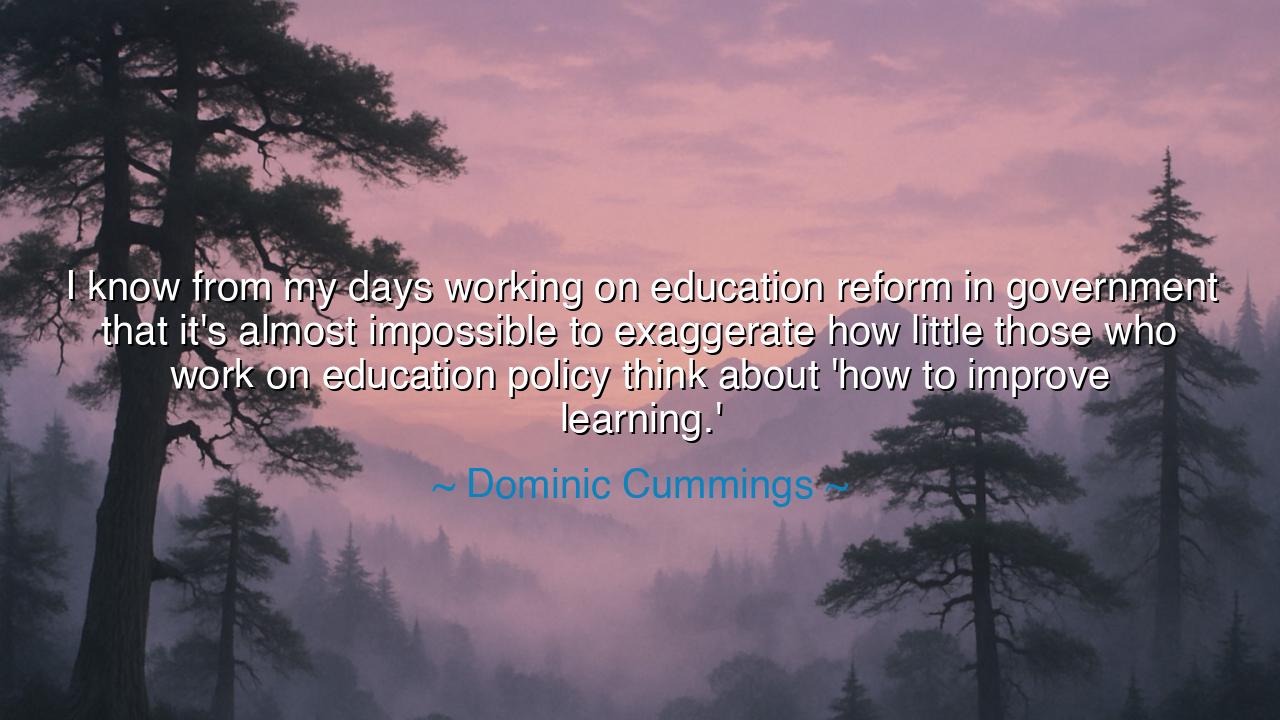
I know from my days working on education reform in government
I know from my days working on education reform in government that it's almost impossible to exaggerate how little those who work on education policy think about 'how to improve learning.'






When Dominic Cummings said, “I know from my days working on education reform in government that it's almost impossible to exaggerate how little those who work on education policy think about ‘how to improve learning,’” he was not merely casting criticism upon bureaucrats — he was issuing a lament, a warning, and a truth that has echoed through centuries of civilization. His words cut to the heart of an eternal paradox: that those entrusted to shape the minds of the young often forget the sacred essence of learning itself. What should be a living fire becomes entangled in papers and procedures, and the human spirit — that most divine instrument of curiosity and wonder — is left untuned.
The origin of this statement comes from Cummings’ experience in the highest chambers of British government, where he served as a chief advisor and strategist. He saw firsthand how education reform, so often spoken of with lofty language, became a battlefield of numbers, targets, and politics. Behind polished speeches and statistics, he found little genuine thought about the art of teaching and learning — how the mind grows, how imagination is sparked, how knowledge transforms into wisdom. What he witnessed was a system obsessed with structure but blind to substance, a temple built for worship without the presence of the divine.
Throughout history, this same tragedy has repeated. The ancient Confucians knew that when scholars chased status rather than understanding, learning decayed into ritual. Socrates, too, battled the sophists of his time — men who taught for profit rather than enlightenment. “Education,” he said, “is the kindling of a flame, not the filling of a vessel.” And yet, even today, governments around the world treat learning as a production line, where the goal is not growth of the soul but the accumulation of measurable results. Cummings, in his quote, reminds us that the heart of education cannot be standardized, legislated, or reduced to metrics. It must be nurtured, with patience and reverence, as the ancients tended their sacred fires.
Consider the story of Maria Montessori, who in the early 20th century dared to question the rigid schooling systems of her day. She saw that children were not clay to be molded by authority, but seeds that would flourish when given sunlight and freedom. Her revolutionary approach — to let curiosity lead, to let failure teach — ignited minds across the world. Yet, even as her methods proved miraculous, institutions resisted. Why? Because true learning requires humility, and bureaucracies rarely possess it. It demands listening to children rather than commanding them — an act that exposes how little we truly understand of the human mind.
Cummings’ reflection, therefore, is not an indictment of individuals alone but of a culture of control — one that fears uncertainty and worships efficiency. The policymakers he speaks of are not villains but victims of an age that prizes form over essence. They build endless systems to manage learning but rarely pause to ask: What is learning? They draft reforms to measure knowledge but seldom seek to inspire it. In this way, the wisdom of the teacher is replaced by the machinery of administration, and the student becomes a statistic rather than a soul.
The lesson within his words is both sobering and liberating: to truly reform education, one must first reform the way we think about it. We must remember that learning is not a policy — it is a human experience, sacred and mysterious. It begins in wonder, thrives in freedom, and matures through struggle. The goal of education is not to create efficient workers or obedient citizens, but whole human beings — capable of thought, empathy, and creation. To lose sight of that is to betray the very purpose of civilization itself.
So let this teaching be passed down: when you build schools, build them not as factories of knowledge, but as gardens of wisdom. Let the teachers be gardeners, not overseers. Let curiosity be honored as much as conformity is now. Let failure be seen as growth, not disgrace. And let governments, as Dominic Cummings urges, remember that the mind cannot be improved through policy alone, but only through understanding. For in the end, no law, however well-crafted, can teach the soul to wonder. Only love, patience, and truth can do that — and it is in those timeless virtues that the art of learning, and the hope of humanity, are forever reborn.






AAdministratorAdministrator
Welcome, honored guests. Please leave a comment, we will respond soon